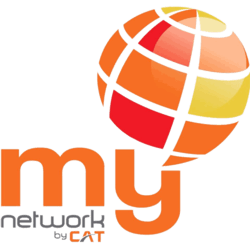CAT Telecom
 | |
| State-owned | |
| Industry | Telecommunication |
| Founded | August 14, 2003 |
| Headquarters | Bangkok, Thailand |
Area served | Thailand |
Key people | General Sirichai Distakul (Chairman) |
| Revenue |
|
|
| |
| Total assets |
|
| Total equity |
|
| Website |
www |
CAT Telecom Public Company Limited is the state-owned company that runs Thailand’s international telecommunications infrastructure, including its international gateways, satellite, and submarine cable networks connections. As of February 2008, it had 5,562 employees[2][3] and is based in Bangkok (Lak Si District).[4]
Services
Until recently, CAT had a monopoly on international telephony and CDMA mobile telephony. CAT is partnered with TOT to provide the GSM mobile service "ThaiMobile". In partnership with Hutchison, it provides a CDMA2000 1X mobile service in 25 central provinces, and operates its own CDMA2000 1xEV-DO in a further 51 provinces.[5] CAT also provides data communications and applications services, such as Leased Line, Fiber-to-the-Premises (FTTx), Gigabit Ethernet, xDSL, Live TV Broadcast, e-Commerce, e-Auction, and e-Security.
Over half of CAT's revenue comes from its mobile concession contracts, Total Access Communication (TAC, dtac Brand), True Move (TM), and Digital Phone Company (DPC, GSM1800 Brand).
History
Established on August 14, 2003, by the government of Thaksin Shinawatra, CAT Telecom was originally known as the Communications Authority of Thailand. Plans were under way to privatize a portion of the state enterprise through an IPO in the Stock Exchange of Thailand but these plans were cancelled after the Thaksin government was overthrown by a coup on 19 September 2006. Soon after the coup, the junta of General Surayud Chulanont announced plans to merge CAT Telecom with rival state telecom enterprise TOT (formerly the Telephone Organization of Thailand).[6]
The junta also appointed General Saprang Kalayanamitr as the new chairman of the board of directors for both CAT Telecom and TOT. Saprang was accused by the founders of People's Television (PTV), a new satellite television station, of being behind CAT Telecom's refusal to grant an internet link from Bangkok to a satellite up-link station in Hong Kong. PTV was established by several ex-executives of the Thai Rak Thai party. CAT Telecom, however, claimed that it never received PTV's application for internet access.[7]
The junta also cancelled the Thaksin government's telecom excise tax policy. The Thaksin government imposed an excise tax on private fixed and cellular services, and then allowed telecom companies to deduct the amount they paid in excise tax from concession fees to TOT and CAT Telecom. The total amount paid by the private telecom firms did not change. The Surayud government's excise tax cancellation meant that TOT and CAT Telecom would receive their full concession payments. However, TOT and CAT were then forced to increase their dividends to the Ministry of Finance to account for their increased income.[8]
On 30 November 2013, during the mass protests going on in Bangkok, a group of unidentified protesters infiltrated CAT Telecom headquarter, which hosted its data center, to cut off its electricity. This affected roughly 92,000 clients of the company, both public and private. This resulted in about 300 million baht ($10 million) in lost transactions. As upon the system shut down, internet was inaccessible, phone lines were down, and ATMs were out of service.[9]
CAT Telecom is also a host network operator who hosts Mobile virtual network operator (MVNO's). CAT Telecom has two MVNOs operating on its 850 MHz network:[10]
- Truemove H a subsidiary of True Corporation
- 168 [11] formerly known as 365 3G Communications
Subsidiaries

CAT Telecom includes the following subsidiaries :
- MybyCAT (Mobile Phone Operator)
- MVNO by CAT
- CAT Internet
Coverage
MybyCAT services are available in the following provinces:
- Bangkok
- Ang Thong
- Kanchanaburi
- Chanthaburi
- Chachoengsao
- Chonburi
- Trat
- Nakhon Nayok
- Nakhon Pathom
- Nonthaburi
- Pathum Thani
- Prachuap Khiri Khan
- Prachinburi
- Phra Nakhon Sri Ayuddhaya
- Phetchaburi
- Rayong
- Ratchaburi
- Lopburi
- Samut Prakan
- Samut Songkhon
- Samut Sakhon
- Sakaeo
- Saraburi
- Singburi
- Suphanburi
- Kalasin
References
- 1 2 3 4 CAT Telecom Financial highlight 2013
- ↑ History of CAT
- ↑ CAT Telecom Website
- ↑ www.cattelecom.com CAT Offices, Headquarters. Retrieved 2013-01-26.
- ↑ Budde.com, CAT Telecom Web Report Archived September 24, 2006, at the Wayback Machine.
- ↑ The Nation, Call for end to policy corruption, 16 October 2006
- ↑ The Nation, PTV says 'CAT attack' ruined debut, 2 March 2007.
- ↑ The Nation, Telecom excise tax revoked, 24 January 2007
- ↑ Tech in Asia. http://www.techinasia.com/thai-protesters-telecom-attacks-cost-country-10-million-damage/
- ↑ "Thailand's MVNO market 2014" Yozzo.com
- ↑ "MVNO 168 Communications launches in Thailand". Yozzo.com Retrieved 2015-05-17
External links
- Official website (Thai)
- CAT CDMA website